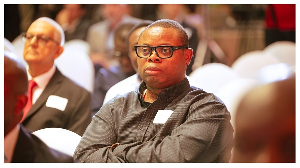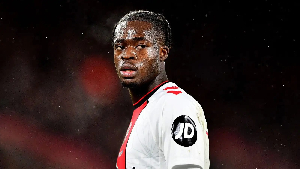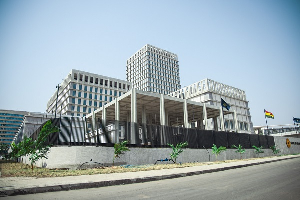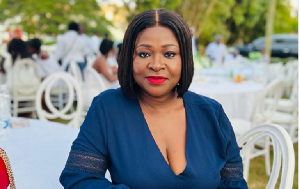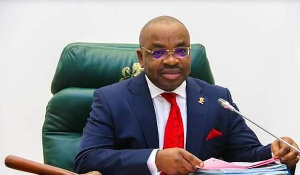I have been out of touch for a few months taking on some additional engagements that made it difficult for me to write. I apologize for the long break and I hope we continue to have more exciting and insightful engagements now that I have resumed.
A few days ago, I was having a discussion with a scientist. He is an astronomer, astrophysicist or probably a mathematician. I say so because anytime I meet him he is always talking about space and stars and galaxies and other amazing scientific things.
My colleagues and I were in his facility, the Ghana Planetarium, to see what he does there. He spoke a lot about the practical and easier methods of teaching and learning of science and the simpler ways of calculating things. He made these things sound so simple.
The Ghana Planetarium is a wonderful place and this scientist called Dr Jacob Ashong has lots of diagrams on his walls that explains everything science – the solar system, light, the moon, Milky Way and several others. He has images that explain the electro-magnetic rays, spectrum, radiation and the different kinds of rays that exists. In short, he tries to provide a hands-on and interactive approach to the learning of science.
As I stood there listening, I tried to digest most of the things we were discussing and to have a full understanding of what he was saying. I told this Doctor of Science that I lost interest in science when I was in secondary school because I could not relate to it.
We ended up talking about Science Communications and how critical it is for science teachers to teach in simple, practical ways. He kept on assuring me that science was very simple and practical much more than I thought. He began to explain certain occurrences and events and how can be calculated following simple methods.
He took us to what I personally call the “wonder building”; the planetarium. There he showed us a short video. I love the place because when you enter the facility you have a feel of what it’s like to be in space. The experience there makes science so real and simple.
When we came out of the planetarium, I stood in awe at the things he spoke about. Why didn’t I have a teacher who could explain things the way he did? Why do some teachers make science so difficult? Why did we have to “chew and pour” when we were in school without knowing the importance of what we were learning?
I recall that during my secondary school days I was selected to read science. As usual, it was normal of teachers to select only the best students in the class to read science up to O level. I remember that back then I chose General Arts over Science and so did many of the other girls who were selected for science. Perhaps the other girls had their own reasons for refusing what they had been offered but I certainly had my reason. I just couldn’t relate to the things I was thought. The only science subjects I liked were Biology and Health Science– at least I could easily understand those.
In fact, Mathematics and Physics were my worst enemies. To me, anyone who understood Mathematics, Physics or Chemistry was a genius. I was a top student though but I didn’t like Science and I didn’t care to know. I had refused to “chew and pour” just to make my teachers happy. I wasn’t bothered then. I was not moved. Not even my desire to be a doctor made me want to give science a chance. In any case, I was afraid of blood and dead people anyway so the faster I dropped this course the better my life would be, I said to myself.
As I stood under the shed at the Ghana Planetarium with Dr Ashong and my colleagues, my mind came back to what we were discussing – Science Communications.
Doctor Ashong has spent a lot of time and his own personal and family resources to develop this science center and to encourage the practical teaching and learning of science. He occasionally has donations from friends and a few institutions. I have visited the center on a few occasions and I see how he gives the kids simple hands-on exercises to make them appreciate the relevance and simplicity of science.
How I wish I had met people like Dr Ashong and others earlier in my life. I love what I am doing now, no doubt but I certainly would have given science a chance if I had not just shut my mind to it. We need more scientists like him with so much passion for the youth and girls in science.
Back then we did not have the magic called the internet and all the information we have now. There was no Youtube or Google. All we had were the big fat dusty science books and the science teachers. How I wish we had been told that doing science was not such a big deal and that it was fun. Today, a simple click of the mouse will give you hundreds of videos, music and simple animations on many science concepts. Just google or search for a concept like Photosynthesis on YouTube and it will amaze you what you will find. In my naivety, I didn’t know that there are a hundred more career options and choices for both girls and boys in science. Of course, now I know that and I can encourage other young girls to go for their dreams.
Women in the Sciences are generally very few. One would think that the numbers will keep rising steadily and that attitudes towards science and technology will improve with time. Some progress has been made but there is more than enough room for improvement. Girls are generally slow in the uptake of anything Science, Technology, Engineering and Mathematics but the story has to change for the better. One sure way of getting girls interested is by making the subject more exciting, interesting and practical.
Projects like the MTN Girl Codes are examples of projects that have been introduced lately to get young women to go into the Telecommunications and ICT space. There is more to be done and we must all get on board to move more girls into the science world.
If I were a scientist I will work hard to encourage more girls to study science. Congratulations to all the female scientists in Ghana. I commend the first Ghanaian female scientist Dr Letitia Obeng and all the great female Science Professors like the late Professor Awura Ama and many others.
Opinions of Saturday, 16 September 2017
Columnist: Georgina Asare Fiagbenu







